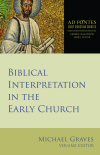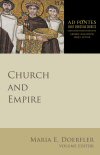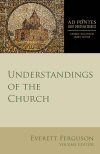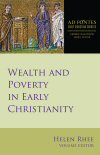Ad Fontes: Early Christian Sources (5 vols.)
Digital Logos Edition
Overview
Ad Fontes: Early Christian Sources is a series designed to present ancient Christian texts essential to an understanding of Christian theology, ecclesiology, and practice. The books in the series will make the wealth of early Christian thought available to new generations of students of theology and provide a valuable resource for the church. Developed in light of recent patristic scholarship, the volumes will provide a representative sampling of theological contributions from both East and West.
The volumes of the series are relevant for a variety of courses from introduction to theology to classes on doctrine and the development of Christian thought. The goal of each volume is not to be exhaustive, but rather representative enough to denote for a non-specialist audience the multivalent character of early Christian thought, allowing readers to see how and why early Christian doctrine and practice developed the way it did.
With Logos Bible Software, these valuable volumes are enhanced by cutting-edge research tools. Important terms link to dictionaries, encyclopedias, and a wealth of other resources in your digital library. Powerful topical searches help you find exactly what you’re looking for. Tablet and mobile apps let you take the discussion with you. With Logos Bible Software, the most efficient and comprehensive research tools are in one place, so you get the most out of your study.

Key Features
- Presents ancient Christian texts essential to understanding Christian theology, ecclesiology, and practice
- Provides a representative sampling of theological contributors from both the East and West
- Seeks to demonstrate how and why early Christian doctrine and practice developed as it did
Product Details
- Title: Ad Fontes: Early Christian Sources Collection (4 vols.)
- General Editor: George Kalantzis
- Series: Ad Fontes
- Publisher: Fortress Press
- Volumes: 4
- Pages: 902
- Resource Type: Ancient Texts
- Topic: Early Church History
Individual Titles
- Biblical Interpretation in the Early Church edited by Michael Graves
- Church and Empire edited by Maria E. Doerfler and George Kalantzis
- Understandings of the Church edited by Everett Ferguson and George Kalantzis
- Wealth and Poverty in Early Christianity edited by Helen Rhee and George Kalantzis

Biblical Interpretation in the Early Church focuses on how Scripture was interpreted and used for preaching, teaching, apologetics, and worship by early Christian scholars and church leaders. This revealing treatment of ancient source material is a valuable tool for modern exegetes. Learn from those who helped define the church in its earliest form. Find time-tested approaches for solving interpretive difficulties from these representatives of the past.
Michael Graves is Armerding Professor of Biblical Studies at Wheaton College, where he teaches courses in Hebrew Bible and the history of biblical interpretation. He has done extensive research in patristic and Rabbinic biblical interpretation. His many publications include The Inspiration and Interpretation of Scripture: What the Early Church Can Teach Us (2014) and the translation of Jerome: Commentary on Jeremiah (2012).

The history of the church’s relationship with governing authorities unfolds from its beginnings at the intersection of apprehension and acceptance, collaboration and separation. Over time, a sometimes paradoxical arrangement became the norm. This volume is dedicated to helping students chart this complex narrative through early Christian writings from the first six centuries of the Common Era. As a part of Ad Fontes: Early Christian Sources, this edited volume provides a helpful answer to questions about the role of government in relation to God’s kingdom.
Maria E. Doerfler is assistant professor of the history of Christianity in Late Antiquity at Duke Divinity School, Durham, North Carolina. Her research focuses on the development of Christianity in its social and political context during the first six centuries of the Common Era, including a new book on intersection of Roman law and monastic and clerical formation at the turn of the fifth century.
George Kalantzis is professor of theology at Wheaton College and director of The Wheaton Center for Early Christian Studies.

Understandings of the Church explores the ways imagery is used by biblical writers and early Christian teachers such as Cyprian, Ignatius of Antioch, Tertullian, Clement of Alexandria, and Origen to describe the concept of church. Focused on the historical self-understanding of the body of Christ, this resource provides a nuanced treatment of how different authors interacted with ecclesiology. Pastors, scholars, and lay-Christians will be able to utilize this text to better understand their corporate identity as a part of the church.
Everett Ferguson is professor of church history emeritus at Abilene Christian University. Past president of the North American Patristics Society, Ferguson has been co-editor or editor of the Journal of Early Christian Studies, Backgrounds of Early Christianity (2003), Recent Studies in Early Christianity (1999), and Encyclopedia of Early Christianity (1990). He is author of The Church of Christ: A Biblical Ecclesiology for Today (1997).
George Kalantzis is professor of theology at Wheaton College and director of The Wheaton Center for Early Christian Studies.

Wealth and Poverty in Early Christianity is designed to introduce the reader to the broad range of texts that reflect early Christian thoughts and practices on the topic of wealth and poverty. These texts include the Shepherd of Hermas, writings by Clement of Alexandria, The Acts of Thomas, and important works by many early church theologians. This study provides readers with a broad cross-section source material focused on the ethics regarding economic class difference.
Helen Rhee is professor of history of Christianity at Westmont College in Santa Barbara, CA. She specializes in early Christian history, focusing on the diverging Christian self-identities. She is the author of Loving the Poor, Saving the Rich: Wealth, Poverty, and Early Christian Formation (2012) and Early Christian Literature: Christ and Culture in the Second and Third Centuries (2005).
George Kalantzis is professor of theology at Wheaton College and director of The Wheaton Center for Early Christian Studies.
About the Editor
George Kalantzis is professor of theology at Wheaton College and director of The Wheaton Center for Early Christian Studies.
Reviews
2 ratings


SEONGJAE YEO
10/5/2019